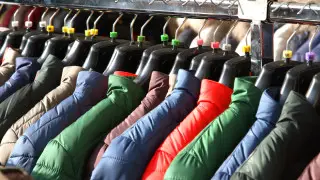Tengrinews.kz - Is it true that even the most expensive down jacket won’t keep you as warm as a fur coat? How do you choose a winter jacket that will truly keep you warm? These questions were answered by a scientist from the Perm National Research Polytechnic University, according to DoctorPiter.
Experts say that even the biggest and warmest down jacket can lose its warmth quickly. Therefore, when choosing a winter jacket, the material of the insulation is crucial.
Currently, artificial materials are most commonly used for fillers. Among them, there are cheap and not very durable options, as well as more advanced ones.
Sintepon (polyester wadding)
"Sintepon is made from polyester fibers that are bonded together which creates a uniform insulating layer. It is cheaper than its analogs, retains heat well, is lightweight, resistant to moisture, and dries quickly," explains Sergey Kotelnikov, a scientist from the Perm National Research Polytechnic University.
However, over time, the polyester wadding clumps together and loses its ability to retain heat. So a polyester-filled jacket probably won’t last for long.
Hollofiber (hollow fiber)
Hollofiber, a more advanced filler, is often used in pillows or winter blankets, but it is also used as an insulator in jackets.
"Hollofiber is made from hollow fibers, which allows it to trap more air and heat," says Sergey Kotelnikov.
Isosoft (siliconized fibers)
If you want a warm, but not overly bulky jacket that won’t add extra pounds visually, Isosoft is an ideal filler.
"Isosoft is made from silicone-treated fibers that are evenly distributed throughout the material. It has excellent heat-insulating properties, is lightweight, doesn’t clump, keeps its shape well, and allows air to pass through," explains the expert.
Synthetic down
There are insulators that mimic natural materials. For example, Thinsulate, which is often called synthetic down.
"These fillers usually consist of small polymer fibers. The most expensive ones are often used in high-quality clothing," says the scientist.
Which filler to choose
According to Sergey Kotelnikov, all artificial fillers are just different types of polyester. They differ from each other in the size of the air pockets between the fibers.
"Air is the main heat insulator in down jackets. Of the listed artificial fillers, synthetic down and Isosoft are the warmest," says the scientist.
Natural down
As for natural insulators, bird down retains heat the best. The expert highlights goose or swan down, which, due to its microstructure, traps more air.
Down jacket or fur coat?
Adherents of natural materials argue that no down jacket will keep you as warm as a fur coat. However, science has disproven this claim.
"Modern high-quality insulators outperform natural furs in their heat-insulating properties. For example, Thinsulate was initially used as an insulator for astronaut spacesuits. The material has unique heat-saving properties and can keep you warm at extremely low temperatures—down to -70 degrees," says the expert.
As for the outer fabric of down jackets, it is most often made of polyester or nylon. Polyester retains heat better, making it ideal for cold weather. Nylon, on the other hand, is lighter and more durable. Additionally, nylon repels moisture well and dries quickly, so, for rainy weather and sports activities, it’s better to choose this material for the down jacket.
Winter 2024/2025 in Kazakhstan: meteorologists clarify the forecast

